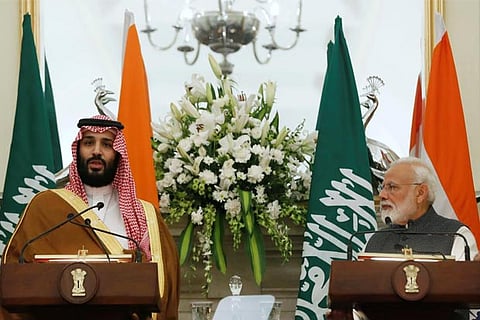

Riyadh
Saudi Arabia understands India's position on Kashmir and it believes what India is doing is betterment of its own population, an Indian source said here on Wednesday.
The source made the remarks a day after Prime Minister Narendra Modi held wide-ranging talks with Saudi King Salman bin Abdulaziz and his powerful Crown Prince Mohammed bin Salman in Riyadh.
"There is a greater political understanding (in Saudi Arabia) of India's position on Kashmir," the source said.
He said there was no discussion on Kashmir during the bilateral talks between Prime Minister Modi and the top Saudi leadership on Tuesday. He, however, said Pakistan did came up during talks between the two sides.
"Saudi considers Kashmir as an internal issue" of India, the source said, indicating that the Saudi side does not support Pakistan on the issue.
A joint statement issued after the delegation-level talks between Prime Minister Modi and Crown Prince Mohammed on Tuesday reiterated "their categorical rejection of all forms of interference in the internal affairs of countries."
The statement also asked the international community to "fulfill its responsibilities towards preventing any attacks on the sovereignty of State", without naming any country.
Tension between India and Pakistan escalated after New Delhi revoked Jammu and Kashmir's special status on August 5.
Pakistan has downgraded diplomatic ties with New Delhi and expelled the Indian High Commissioner.
Saudi Arabia, known to be a key ally of Pakistan, has been siding with India in its campaign to rid the region of terrorism and pledged to extend all cooperation to effectively deal with the challenge.
The joint statement condemned terrorism in all its forms and manifestations, and agreed to step up bilateral security cooperation.
"The two sides stressed that the extremism and terrorism threaten all nations and societies. They rejected any attempt to link this universal phenomenon to any particular race, religion or culture," it said.
It said that both sides expressed their rejection of all terrorist acts and stressed the need to prevent access to weapons including missiles and drones to commit terrorist acts against other countries.
Visit news.dtnext.in to explore our interactive epaper!
Download the DT Next app for more exciting features!
Click here for iOS
Click here for Android